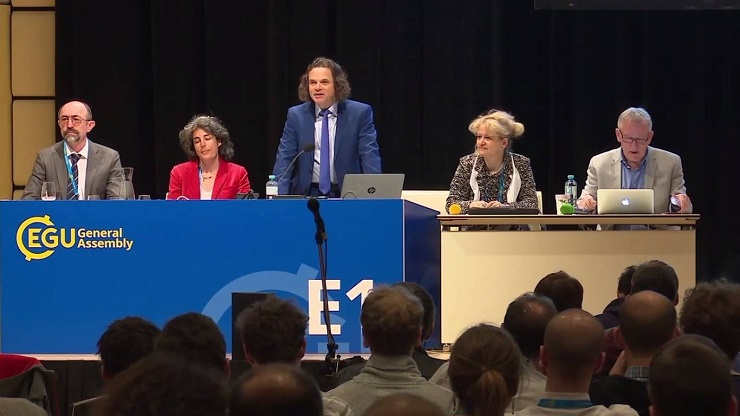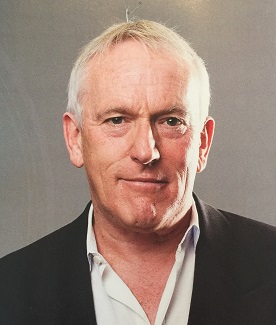|
Plan it Earth: Is there enough resource for all?
Tuesday, 19th April 2016
Austria Center Vienna
EGU Great Debate on Resource Use
European Geosciences Union
General Assembly 2016
Convened by: Caspar Hewett, Jonathan Dick, Paul Quinn,
Mark Wilkinson and Chris Juhlin
Discussion of natural resource depletion has been widespread for over four
decades, yet there still seems to be little consensus on what to do about it.
Some argue that small is beautiful and that we should all consume less.
Others believe that we need to think more ambitiously and that the only limit
to resources is our imagination. How do we as the geoscientists engage with
these highly differing positions? Is the demand for natural resources exceeding
what the Earth can produce? If so, what can we do about it? As our knowledge
grows, does our ability to act and solve problems grow with it?
If the geosciences community understands the intimate interactions between for
example water, energy and food supply, a view expressed recently in terms of
the water, food and energy nexus, we should be able to make a real contribution
to joined-up thinking in the way that resources are managed. So, how can we
ensure that our understanding influences management practices? Can we identify
underlying approaches to apply to problems? Can we solve current problems
without compromising the requirements of the future?
This Great Debate will address these questions and critically examine the
controversy surrounding management of resources.
You can tweet about the debate using #tgd16 and
#egu16
Panellists:
Professor Günter Blöschl,
Vice-President, EGU
Livia Peiser,
United Nations Food and Agriculture Organization
Dr Ioana Popescu,
UNESCO-IHE Institute for Water Education
Professor James Woudhuysen,
journalist and author
Chair: Dr Caspar Hewett
Join
The Great Debate
facebook group or
visit The Great Debate facebook page.
Follow us on twitter: @greatdebateuk
Tweet about the debate using #tgd16
Top of page
|
|

|
Speakers
|
Prof. Günter Blöschl
Günter Blöschl is Vice-President of the European Geosciences Union (EGU) and
was its President from 2013 to 2015, and President of the Division
"Hydrological Sciences" (HS) of the EGU from 2002 to 2007.
His principal research interests are understanding and predicting hydrological
processes across scales. He is operating the
Hydrological Open Air Laboratory (HOAL)
that aims at understanding flow and transport processes with high temporal
and spatial detail and is interested in distributed hydrological modelling
using remotely sensed snow and soil moisture data, scale issues, regional
process hydrology, climate change impacts, environmental change, socio-hydrology,
predictions of floods and droughts, and flood risk estimation.
The fruits of that research (about 300 articles and over 8000 citations) have been
recognised by his receipt of numerous honours including the IAHS/UNESCO/WMO Hydrological
Sciences Award, election as a Fellow of the American Geophysical Union (AGU), Member of
the German Academy of Science and Engineering (acatech), Corresponding Member of the
Austrian Academy of Sciences (ÖAW) and the AGU Horton Medal. Recently he was awarded the
Advanced Grant of the European Research Council (ERC) on River Flood Changes.
Günter Blöschl is Editor of Hydrology and Earth Systems Sciences (HESS) and Water
Resources Research (WRR), and Editorial Board member of five other leading journals. He
chairs the Scientific Advisory Council of the German Federal Institute of Hydrology (BfG)
and sits on the steering committee of the NFP61 of the Swiss National Science Foundation.
He has been the chair of the Predictions in Ungauged Basins (PUB) initiative of the
International Association Hydrological Sciences whose Synthesis book he has edited.
Günter Blöschl has participated in teaching at all University levels. He has mentored
three generations of students over the past 20 years.
He is the founder and Director of the Vienna Doctoral Programme on Water Resource
Systems, a multi-year inter-disciplinary PhD program at the Vienna University of
Technology funded by the Austrian Science Fund that focuses on connecting biogeochemical
and ecological processes impacting on water quality.
Throughout his career, Professor Blöschl has been a strong advocate of
bridging the gap between fundamental process understanding and the practice
of water resources management.
|
|
Livia Peiser
Livia Peiser is a Spatial Analysis Officer in the Land and Water Division of the
United Nations Food and Agriculture Organization.
Her work focuses on water resources assessment, water use in agriculture, agricultural
water management for rural poverty alleviation. She’s currently involved in projects
related to water accounting and crop water productivity monitoring in Africa, the Near
East and Asia. Through her work, she brings innovative remote sensing applications in
agricultural development programs, while maintaining a people-centred approach.
She’s a geographer with specialization in spatial analysis and natural resources
management. Prior to joining FAO, she has been applying GIS and Remote Sensing tools
for several years on different subjects in UN and other development organizations
(food security and vulnerability analysis, forest monitoring, cadastral mapping,
and archaeological sites monitoring).
|
|
Dr Ioana Popescu
Ioana Popescu is currently Associate Professor of Hydroinformatics at
UNESCO-IHE Institute for Water Education in Delft, The Netherlands.
Her research focuses on computational methods, aspects of flood modeling
and vulnerability related to floods, lake and reservoir modeling and
water supply systems modeling and optimisation. She is particularly
interested in integrating mathematical models into decision support systems.
She is a member of several Engineering associations and research schools,
like the International Association for Hydro-Environment Engineering and Research
(IAHR), the European Geophysical Union (EGU) and of the SENSE research school.
Currently she is the Chair of the IAHR Committee on Education and Professional
Development.
Prior to joining UNESCO-IHE in 2001, she worked
as a postdoc researcher at the Institute for Research in Construction of the
National Research Council of Canada in the area of rehabilitation of urban
infrastructure, where she was involved in the development of a
finite element based prediction tool for flexible pavement structures
subjected to both environmental and traffic-induced loading.
Previous to that she worked as an Associate Professor at
Faculty of Hydrotechnics, Timisoara, in Romania, in the area of
river systems modeling and computational hydraulics. In particular she was
involved in the development of a finite element code for testing
the influence of hydrodynamic pressures on dams, and in projects and
teaching related to hydropower and dams.
|

|
Prof. James Woudhuysen,
James Woudhuysen is a journalist and author of several books.
He is currently Visiting Professor at London South Bank University and was
previously Professor of Forecasting and Innovation at
De Montfort University, Leicester. James has a knack of registering trends
before other people, and offering counter-intuitive proposals on what
to do about those trends. His diverse contributions span nearly five decades,
including helping to install and test Britain’s first computer-controlled
car park in 1968; writing about chemical Weapons of Mass Destruction in
The Economist, 1978; co-directing Britain's first major study into
the future of e-commerce in the 1980s; working for the Henley Centre,
Britain's best-known think-tank on EU markets, where he built up the firm's
forecasting on the broader future of IT and proposed, in 1992, that the
Internet be delivered over TV; reorganised worldwide market intelligence at
Philips Consumer Electronics, 1995-7; issuing a devastating critique of
America’s dot.com boom, 1999; forecasting today’s obsession with work-life
balance in 2000; upholding 3G mobile communications in the face of massive doubts,
The Guardian, 2002; and influencing UK government policy in favour
of the mass production of housing, 2004. His 2008 book,
Energise!: A Future for Energy Innovation co-authored with Joe Kaplinsky,
is a powerful treatise which, on top of discussing the nature and extent of
climate change, analyses humanity's response to it.
|
Top of page
|
|
Home |
Future Events |
Previous Events |
People |
Articles |
Reviews |
AboutUs |
© C J M Hewett,
2016
|



